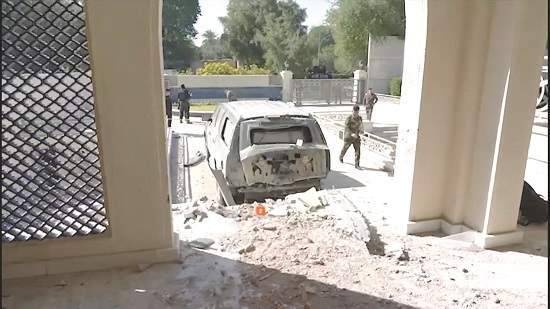The daring attempt on the life of Iraq’s Prime Minister Mustafa Al-Kadhimi early Sunday at his residence in the heavily fortified Green Zone should not have come as a surprise. As Kadhimi himself said a few hours after the attempt, the culprits are known. For weeks, following the announcement of the early results of last month’s legislative elections, pro-Iran militias and parties, which suffered significant losses, continued to protest what they claimed were election frauds demanding that the outcome be overturned or a manual count be implemented. But that was not what triggered Sunday’s attack.
اضافة اعلان
-Hard-line heads of the pro-Iran Popular Mobilization Units (PMU), factions operating under the Al-Fatah Alliance, made direct threats targeting Kadhimi and members of the Independent High Election Commission. The PMU’s Hadi Al-Amiri rejected the election results as fabricated outright, while the leader of Asaib Ahl Al-Haq, Qais Al-Khazali, threatened to use force as the only way to change the outcome of the elections. The alliance has a dozen or more other factions including Iraqi Hezbollah; a militant group that may have been complicit in carrying out Sunday’s attack.
-Three explosive laden drones were used in the assault; two were shot down while one managed to strike Kadhimi’s residence. The drones came from the east, according to security reports, pointing to Iran directly or indirectly.
Even though Kadhimi survived the attack, with minor injuries, the message was clear. It was meant to disrupt Iraq’s fledgling democratic process — one that is plagued by ethno-sectarian divisions, a controversial quota system, and the invisible hand of Tehran’s Al-Quds Brigade. Despite its numerous deficiencies, fanatic pro-Iran militias wanted to manipulate the system to their own interests. And when Iraqi voters had their say; they stepped in to over-turn the results.
=What happened in Baghdad last Sunday morning was tantamount to a military coup. Pro-Iran militias, whose followers had barricaded the Green Zone for days to protest the outcome of the elections, believed they could intimidate Kadhimi at first, and then eliminate him to hijack the political process. It was political suicide.
What is shocking is that a few days after the initial election results were announced, former prime ministers, Hamed Abbadi and Nouri Maliki, joined by moderate cleric Ammar Hakim and others, tried to form an alliance that would derail the election results. The head of the largest bloc so-far, nationalist Shiite cleric Muqtada Sadr refused to join them. They are now seen as having provoked yet a deeper crisis for Iraq.
 This image grab shows a damaged vehicle after a drone strike on the prime minister’s residence. Jordan News Editor-in-Chief Osama Al Sharif, writes that the prime minister must now deal with the pro-Iran militias to “keep his country from sinking into a dark chapter of political assassinations and possible civil war.” (Photo: AFP)
This image grab shows a damaged vehicle after a drone strike on the prime minister’s residence. Jordan News Editor-in-Chief Osama Al Sharif, writes that the prime minister must now deal with the pro-Iran militias to “keep his country from sinking into a dark chapter of political assassinations and possible civil war.” (Photo: AFP)
Kadhimi is a non-partisan Iraqi nationalist who had sought keep his country neutral in the ongoing US-Iran showdown. He has been supported by countries like Saudi Arabia, Jordan, Egypt, and the UAE. The aim was to distance Iraq from Iran and bring the country back into the Arab fold; an anathema to pro-Iran proxies.
With all fingers pointing to Iran, it was interesting that the head of Islamic Revolutionary Guard Corps (IRGC), Brig. Gen. Esmail Qaani, met with Iranian-backed militias and officials in Iraq hours after the assassination attempt. The commander of the IRGC’s Quds Force was quick to head to Baghdad to try to put some restraint on the very forces Tehran had unleashed. While Iran, among other countries, had condemned the assassination attempt, it is difficult to exonerate it from participating directly or indirectly in the crime.
The incident is a watershed moment in ties between Iran and its Iraqi proxies on the one hand, and between Tehran and Baghdad on the other. Iran is playing a dangerous game in Iraq; one that is about to spoil all of its victories since the 2003 US invasion that toppled the regime of Saddam Hussein. It is the only regional power that is able to supply drones to its proxies; who have attacked US bases in Iraq frequently using such weapons.
Qaani’s arrival signals a worrying message: that some pro-Iran Iraqi militias are getting out of control. The blame will have to be laid on Tehran directly. By supporting rogue factions and supplying them with such critical weapons, it is now the main suspect in Sunday’s plot.
Kadhimi now has few choices before him if he is to survive politically and keep his country from sinking into a dark chapter of political assassinations and possible civil war. He must find a way to neutralize and contain the PMU and other militant groups that see themselves as subservient to Iran. It’s a bold challenge that may fail rather than succeed. The entire region is sick and tired of Iran’s meddling and its disruptive regional agenda. Kadhimi’s challenge is not easy. The coming days and weeks will be crucial for Iraq and any move he takes will be met with a fierce reaction. Taking on the pro-Iran militias will determine the future of Iraq as a sovereign country.
Osama Al Sharif is a journalist and political commentator based in Amman.
Read more Opinion and Analysis





